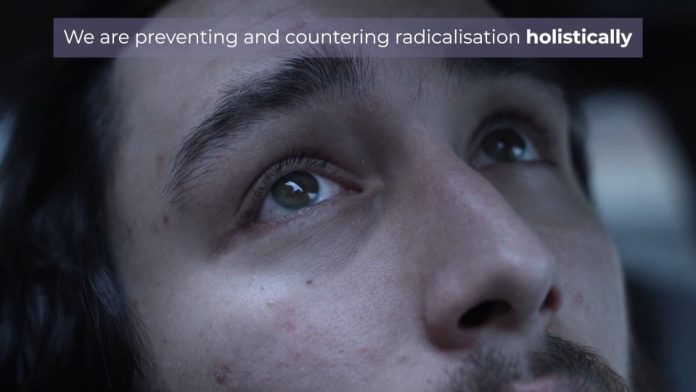The field of radicalisation prevention is laden with difficulties and uncertainties for the professionals involved. There is no absolute path to radicalisation, as individuals are as complex as they are unique. Any approach should be holistic and adapt to particular paths or vulnerabilities.
The differences in prison and probation contexts, and the multitude of professional roles involved in the process, make it hard to follow and to evaluate results as far as P/CVE efforts are concerned.
Despite the available tools, risk management and assessment of the effectiveness of one practice over others are difficulties faced every day, not only throughout the described range of different professionals but across borders, with very distinct approaches. The training and resources available to these key personnel are unequivocally linked to the success of radicalisation prevention initiatives.
This need is in the origin of the European Learning Hub on Radicalisation. Within the scope of project HOPE (Holistic Radicalisation Prevention Initiative), focused on the Balkans, it’s a growing network that supports continuous training, sharing of information and experience on the topic of P/CVE.
Making the most out of the network: the project’s thematic transnational workshops
HOPE’s network is engaged and activities have begun in full steam with two of the planned eight Transnational Thematic Workshops that gather practitioners and researchers to reflect, and discuss country-specific peculiarities, programmes, best practices and strategies.
With 70 participants from 12 European countries, the first Transnational Thematic Workshop explored and debated the practitioner’s role in P/CVE and radicalisation in the Balkan region. The event titled “Preventing radicalisation and violent extremism in the Balkans – The role of criminal justice settings” took place, online, on November 19th, 2021.
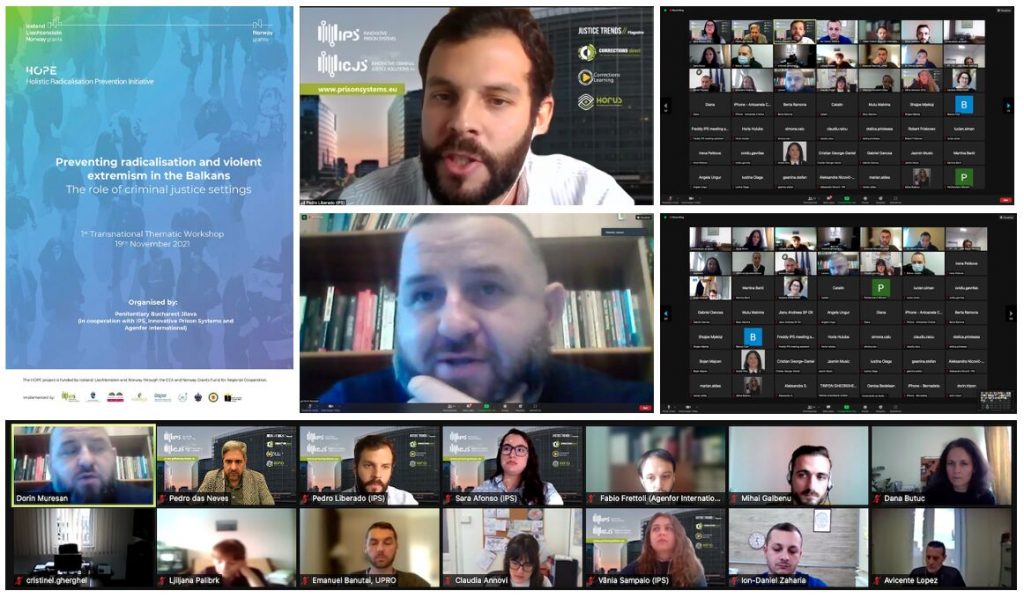
The event opened with a presentation by renowned expert Dorin Muresan from the International Corrections and Prisons Association (ICPA). His contribution was about “Regional solutions for regional challenges – A historical perspective on preventing radicalisation and extremism in the Balkans”.
This presentation provided a comprehensive historical perspective on P/CVE in the region and shared interesting practical examples of initiatives implemented in this area.
Moreover, researcher Josep García Coll, from the Euro-Arab Foundation for Higher Studies (FUNDEA), presented “An overview of P/CVE in South-eastern Europe: Approaches, challenges and practitioners’ impressions” and provided a relevant analysis of facts and figures regarding P/CVE in the South-eastern Europe region.
In addition, the event comprised a sub-workshop called “A hands-on approach to P/CVE” which actively engaged participants and promoted pertinent and thought-provoking debates on the implementation of local/regional P/CVE initiatives. It also explored the participants’ professional roles and potential contributions to the field.
For its second Transnational Thematic Workshop, the conversation focused on “A multi-agency approach to P/CVE in the Balkans, Southern and Eastern Europe: The penitentiary system’s centrality and needs”. This activity was held on the 9th of December 2021, in the scope of EEA and Norway Grants Regional Funds Week and had 49 participants from 18 countries.
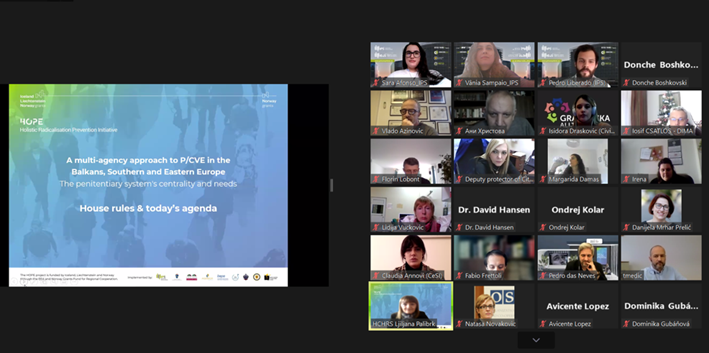
After the welcome and event overview by moderator Ljiljana Palibrk from the Helsinki Committee for Human Rights in Serbia, Vlado Azinović from the University of Exeter and the University of Sarajevo had a presentation focused on understanding the phenomenon of returning foreign terrorist fighters (FTFs) and its impacts on the criminal justice systems of Western Balkan countries.
The second speaker, Donche Boshkovski from the Council of Europe, explored the results of the Council of Europe’s work regarding P/CVE in the Western Balkans and spoke on the current gaps and needs regarding P/CVE in the region, and necessary next steps.
Important entities such as the Council of Europe, the Organization for Security and Co-operation in Europe (OSCE), and the United Nations Office on Drugs and Crime (UNODC) took part in the event, which denotes the significant reach and importance that the HOPE project is achieving as it unfolds.
The Helsinki Committee for Human Rights in Serbia, in cooperation with IPS_Innovative Prison Systems and Agenfor International, was responsible for organising the workshop.
Bringing HOPE under the spotlight
To spread its message to a broader audience, the HOPE video is now available. This video aims to briefly explain the concerns that underlie the project, the objectives of the initiative, and the actions that the project partnership is taking to contribute to radicalisation prevention in a holistic perspective.
The HOPE project’s presence within “Regional Funds Week” was yet another opportunity to increase visibility and strengthen our network.
In this event’s Virtual Hall, which emulated a real-life conference, visitors could enter the space for the Regional Cooperation Fund and stop by HOPE’s digital booth. The visitors were able to get an overview of the project from the presentation video, learn more about it in the image gallery or through its downloadable documentation, as well as book an appointment to talk directly with a project representative.
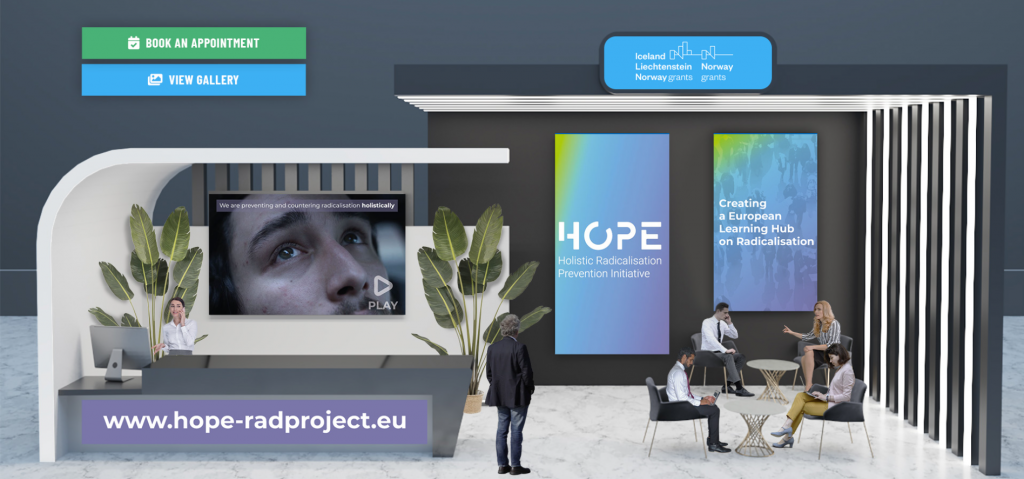
A project with a focus on inclusivity
HOPE’s final goal is a society where all its members feel part of a diverse whole and do not feel the need to turn to radical views or violent behaviours. In this framework, the project contributed to an inclusiveness and cooperation round table on the first day of “Regional Funds Week”, alongside six other impactful projects.
Represented by IPS’s CEO Pedro das Neves, together with Ljiljana Palibr, Project Manager of the Helsinki Committee for Human Rights in Serbia, HOPE’s intervention had an important contribution to the role of international cooperation to craft holistic and systemic solutions. This concept is at the core of the project design and is its mission to unite partners across its geographical scope in a united learning hub.
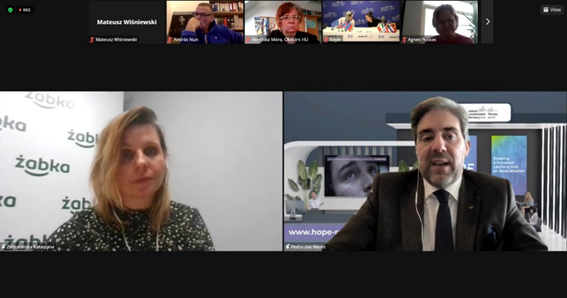
The advantage of inter-project cooperation to accomplish gradual systemic changes was highlighted by the moderator Katarzyna Zabratańska, Manager for Equality and Inclusive Culture at Żabka Polska. Her conclusion let an important reminder that the efficient and respectful path for inclusiveness and equality means working “with” instead of “for” the communities.
What’s next for HOPE?
Two new online Transnational Thematic Workshops are set for the beginning of 2022, to continue engaging the network and building upon previous meetings. Four presential events will hopefully follow these and allow for an even stronger involvement between the participants.
The report on P/CVE needs assessment for prison and probation in the partner countries (Portugal, Spain, Italy, Norway, Slovenia, Serbia, Bulgaria, Romania) will be published in the first quarter of 2022. This data will provide an even stronger foundation to build a useful and relevant knowledge-sharing network.
The HOPE Initiative is led by IPS_Innovative Prison Systems (Portugal) in partnership with the University College of Norwegian Correctional Service (Norway), Agenfor International Foundation (Italy), the Euro-Arab Foundation for Advanced Studies (Spain), the Bulgarian Association for Policy Evaluation, the Bulgarian General Directorate “Execution of Sentences”, the Bucharest-Jilava Penitentiary (Romania), the Helsinki Committee for Human Rights (Serbia) and the Slovenian Probation Administration (Ministry of Justice).
For more information about the HOPE project, please visit its website.

